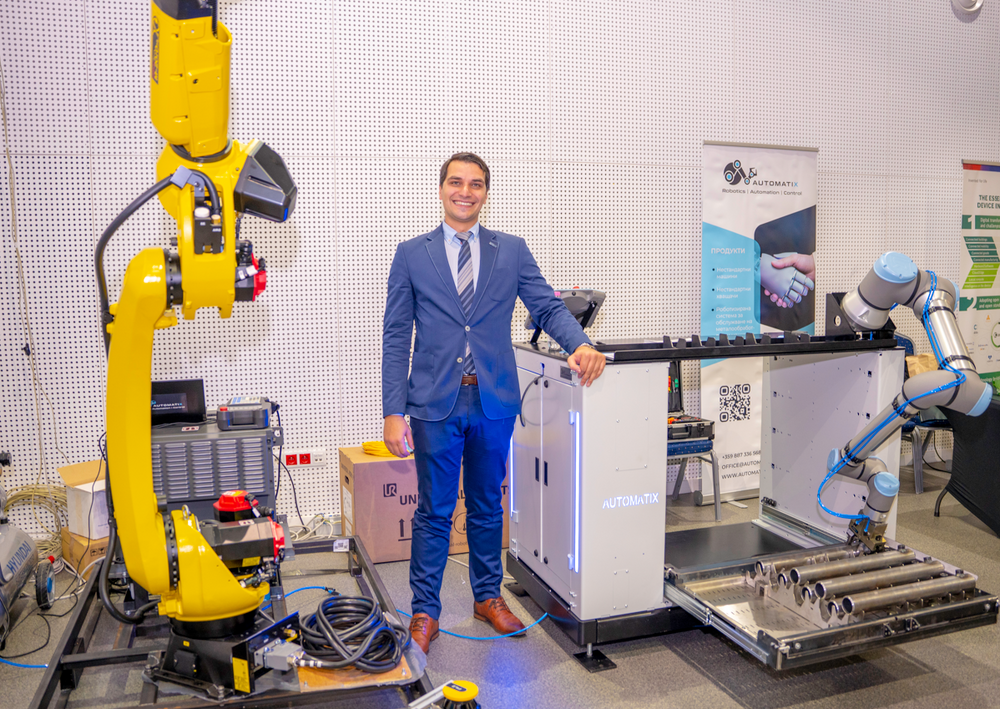site.btaGrowth in Number of Installed Industrial Robots in Bulgaria Expected to Slow to 8.2% in 2025


The Professional Association for Robotics, Automation, and Innovation (PARAi) expects a slowdown in the growth rate of installed industrial robots in Bulgaria to 8.2% in 2025, compared to nearly 10% recorded in 2024, according to Yonko Chuklev, Deputy Chairman of PARAi. He was interviewed by BTA ahead of an upcoming Robotics Strategy Forum (RSF2025), which will take place on September 11 at Sofia Tech Park.
According to Chuklev, there are two main reasons for the expected slower growth in 2025 compared to 2024. First is the lack of qualified personnel capable of programming, integrating, and maintaining robots. He noted that some investments and projects are being delayed precisely due to the shortage of highly skilled workers. And second – a decline in certain segments of the manufacturing industry, such as basic metals production and paper, cardboard, and related goods. These declines create an uncertain environment and delay investments in robotics and automation technologies.
Chuklev noted that the number of robots per 10,000 workers in Bulgaria is expected to increase significantly in 2025 compared to 2022. Forecasts indicate that the country may reach about 30 industrial robots per 10,000 workers in 2025, up from 18 robots in 2022. If service robots are also included in the estimate, the figure approaches 50 robots per 10,000 workers, reflecting the accelerated integration of automated systems in both industry and the service sector.
In 2024, PARAi members deployed 191 robots, said Chuklev. Current trends suggest that around 207 robots may be deployed by the end of 2025. However, there's also a parallel trend of PARAi members shifting towards more complex and larger-scale robotics projects, which could mean fewer than 200 robots are ultimately deployed in 2025—but with higher complexity and value, he emphasized.
Bulgaria’s Position in Europe
According to data from Eurofound, Bulgaria surpasses five EU countries, Cyprus, Greece, Malta, Romania, and Luxembourg, in the share of enterprises using industrial robots. In the field of service robotics, Bulgaria ranks ahead of Greece, Cyprus, and Romania. This progress is largely due to innovative projects implemented by small and medium-sized enterprises (SMEs) and an increased interest in automation in traditionally less robotized sectors.
According to Statista, revenues of Bulgarian companies in robotics and automation are growing faster than the regional average.
Comparison with the EU and Global Trends
In 2022, the average number of industrial robots in the EU was around 106 per 10,000 workers. Bulgaria still lags behind in this respect but is closing the gap at a faster growth rate than some more developed economies, thanks primarily to investments in innovation and modernization, said Chuklev.
According to PARAi, the number of installed industrial robots in Bulgaria is expected to grow by 8.2% in 2025. The main application areas are packaging, welding, turning, and milling. In the service sector, automation is expanding into logistics, airports, warehouses, and distribution centers.
Innovations and Key Projects
Bulgaria’s progress is also supported by innovative robotics projects, such as the deployment of an automated guided vehicle (AGV) that navigates industrial environments based on a predefined route and task list, developed by the Bulgarian company Siviko, and the creation of a weeding robot by the company Smart Farm Robotics. Even in sports, robots are now being used, for example, in the maintenance of the training grounds of PFC Ludogorets, Chuklev noted.
Breakthrough Half-Year
The first half of 2025 was among the most successful periods for Bulgarian robotics, shared Yonko Chuklev, Deputy Chairman of PARAi. UVIONIX, a company founded by Bulgarians, raised $3.5 million to develop autonomous flying robots. Delivers.ai moved the production of its delivery robots to Haskovo. Simobotics was named one of the top five most promising robotics companies in Europe at the euRobotics 2025 awards in Stuttgart. Intuitive Surgical, a US-based company, opened a plant in Parvomay for the production of 3D endoscopes used in surgical robots. INSAIT (Institute for Computer Science, Artificial Intelligence and Technology) and MIT CSAIL launched a joint research and exchange program. MIT CSAIL is a historic incubator of projects in robotics and artificial intelligence.
Catalysts for Future Growth
According to Chuklev, the following are key factors that could accelerate the adoption and development of robotics solutions in Bulgaria. The Industry 4.0 Program provides grants for SMEs investing in automation, cybersecurity, and digital transformation. New venture capital funds are increasingly active in supporting enterprises in robotics and automation technologies. European programs and funds, such as Horizon Europe and the European Innovation Council (EIC), offer significant funding and international partnerships.
Back in September of last year, in an interview with BTA, Chuklev shared that PARAi anticipated a growth rate of nearly 10% (9.8%) in the number of installed industrial robots in Bulgaria for 2024. In 2023, PARAi members integrated 85 robots across the country, he noted at the time
/PP/
news.modal.header
news.modal.text